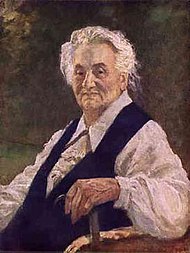Olga Forsh
| Olga Forsh | |
|---|---|

Portrait by Alexei Mozhaev
|
|
| Born |
May 28, 1873 Gunib, Dagestan |
| Died | July 17, 1961 (aged 88) Leningrad, Soviet Union |
Olga Dmitryevna Forsh (Russian: О́льга Дми́триевна Форш, Oljga Dmitrijevna Forš), née Komarova (Russian: Комаро́ва) (May 28 [O.S. May 16] 1873 – July 17, 1961), was a Russian/Soviet novelist, dramatist, memoirist, and scenarist.
Forsh was born in the fortress at Gunib, in Dagestan, the daughter of a major general in the Russian Imperial Army. Her father met her mother, Nina Shakhetdinova, an Azerbaijanian, while he was stationed in the Caucasus. Nina died when Olga was very young. Olga's stepmother, who was also her former nurse, showed little interest in her, especially after the birth of her own daughter by Olga's father. When her father, Major General Komarov, died in 1881 Olga was placed in an orphanage for children of the nobility.
She married Boris Eduardovich Forsh, who had also been born into the family of a high-ranking military officer, in 1895. In the 1890s she studied at various art schools, most importantly in Kiev and St Petersburg, where she worked in the studio of Pavel Chistyakov.
In 1904 Boris Forsh resigned from the military in objection to his having to serve at the executions of political prisoners. He was deprived of his salary, and he and Olga moved to a farm in the Ukraine with their two children. Olga was also pregnant at the time. She later attributed the inspiration for her early stories to this extended period of living among the peasantry. Her first works of fiction were published in 1907. She continued drawing and painting, and worked as an art teacher at the Levitskaya School in Tsarskoye Selo in 1910-11, but she turned toward writing as time went by.
Olga was interested in the fashionable ideas of the time, including Tolstoyanism, Theosophy and Buddhism, but was increasingly drawn to Socialism. After the Russian Revolution of 1917 Olga and her husband became active supporters of the Bolsheviks. Olga's husband died of typhus while serving with the Red Army in Kiev. After his death she continued to dedicate herself to cultural work.
...
Wikipedia
